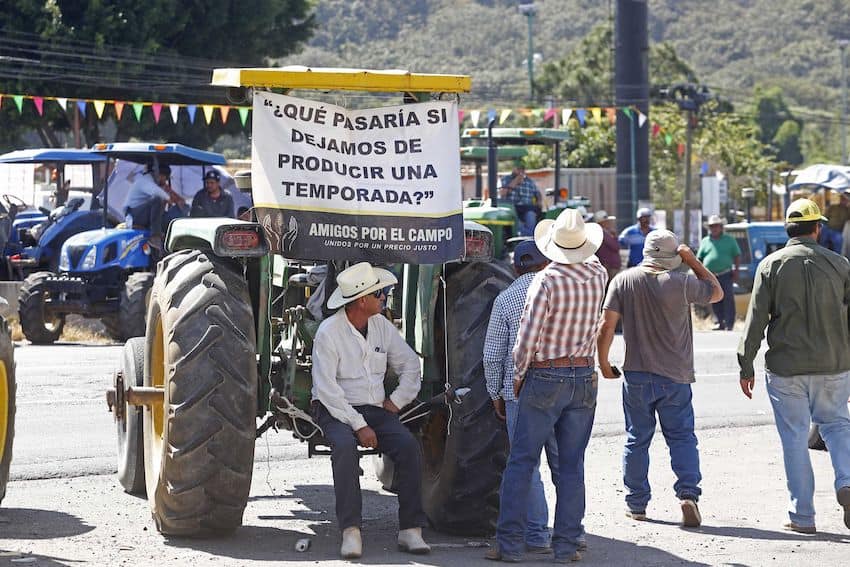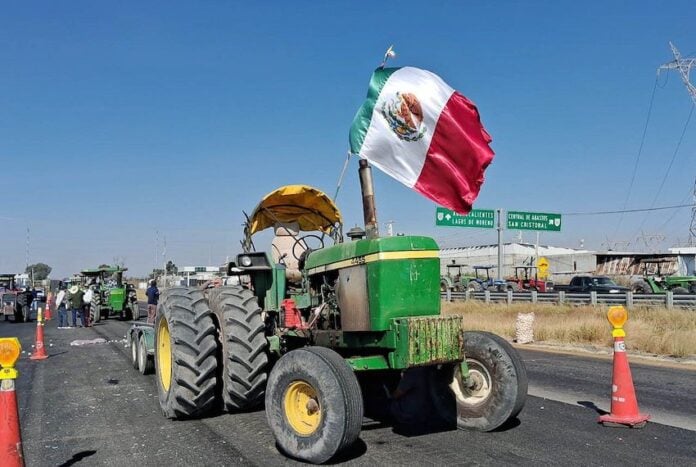The Mexican government reached an agreement early Wednesday morning with corn producers, offering 950 pesos per tonne in direct support — 800 pesos from the federal government and 150 pesos from state governments.
The deal will benefit 90,000 small-scale producers with plots of up to 20 hectares and cover up to 200 tonnes per producer.
Farmers across Mexico took to the streets and highways on Monday to protest what they see as low and unsustainable prices for their produce.
Their central demand was that the federal government raise the guaranteed purchase price for corn to 7,200 pesos (US $391) per tonne — 23% higher than the current guaranteed price of 5,840 pesos per tonne.
Thousands of farmers protested in more than 20 states, blocking highways and toll plazas and demonstrating in front of the National Palace in Mexico City. Farmers also attempted to break into federal Interior Ministry offices in the capital.
Among the states where protests occurred on Monday were Guanajuato, Querétaro, Michoacán, Guerrero, Chihuahua, Morelos and Jalisco. Farmers took their protests to federal Agriculture Ministry and National Water Commission offices in some states, the newspaper El Universal reported.
Protests continued in some parts of the country on Tuesday. In Michoacán, a blockade on the Morelia-Zinapécuaro highway surpassed the 24-hour mark on Tuesday morning. Some motorists and bus passengers had been stranded for an entire day “without water, food and medicine,” according to journalist Joaquín López-Dóriga.
Disgruntled farmers say that their production costs have increased in recent years, but prices for agricultural goods haven’t kept pace.

According to an analysis conducted by the Agricultural Markets Consulting Group (GCMA), agricultural production costs have increased by more than 46% in the past five years, while international prices for corn, wheat and soybean have fallen between 30% and 50% since 2022.
“The result has been a collapse in the profitability” of Mexican farms,” according to the news outlet Revista Espejo, which reported on the GCMA analysis.
“In the case of white corn, the average national [profit] margin has declined from more than 50% in 2022 to barely 12% in 2025. Similar cases are observed in bread wheat and sorghum,” Revista Espejo reported.
It said that the situation “threatens the viability of thousands of medium and large producers” in Mexico who “supply more than 75% of the national and export market.”
Another Revista Espejo article republished by GCMA states that “Mexico is going through one of the worst agri-food crises in more than four decades.”
“Corn producers, who sustain the national diet and rural identity, face an unprecedented scenario of high costs, low prices, and a lack of effective public policies. The combination has triggered what experts are already calling ‘the perfect storm’ for the Mexican countryside.”
The government led by former president Andrés Manuel López Obrador introduced guaranteed prices for agricultural products, including corn, beans, wheat and rice in 2019.
The guaranteed prices have increased since then, but in the same period, farmers have faced a range of challenges, including high inflation that peaked at close to 9% in 2022 and severe drought in much of the country. For some farmers, extortion and violence make farming — and life — even more difficult.
What’s a fair price for a tonne of corn?
During the president’s Wednesday morning press conference, Agriculture Minister Julio Berdegué explained that the 950 peso per tonne support package represents a response to global market conditions that have severely impacted Mexican farmers.
He noted that international corn prices currently hover around 3,400 pesos per tonne, reaching 4,850 pesos once logistics costs are included — levels that “don’t cover production costs for many Mexican producers.”
Hoy, en la #MañaneraDelPueblo, y por instrucciones de nuestra presidenta @Claudiashein, presenté los acuerdos alcanzados con los liderazgos locales de productores de maíz de los estados de Guanajuato, Jalisco y Michoacán.
1. Entre los gobiernos estatales y la federación se… pic.twitter.com/bPahkP2DES
— Julio Berdegué (@JulioBerdegue) October 29, 2025
“We’ve had an enormous increase in the availability of corn worldwide, with a record stock of 1.3 billion tonnes. Mexico will also have a very high harvest this year, which has pushed international prices downward,” Berdegué said.
The agreement also includes the expansion of the “Cosechando Soberanías” (Harvesting Sovereignties) program, which will offer credit at an 8.5% annual interest rate — half what commercial banks charge — along with agricultural insurance covering losses from droughts, floods and pests.
Additionally, President Sheinbaum announced the creation of a Mexican System for Market Organization and Corn Marketing, which will seek to establish reference prices, direct agreements between producers and industry and clear rules to make the marketing chain more transparent.
“We cannot continue in a country where farmers plant without knowing at what price they’ll sell their harvest,” Berdegué said.
The agriculture minister indicated that producers told government officials they don’t want a fixed price, “because they have the expectation that in these dialogue tables, which we’re going to set up starting now, they can still push the price up a bit.”
President Sheinbaum emphasized that the support will go directly to producers without intermediaries, and noted that major flour companies agreed months ago, following negotiations led by the Agriculture Ministry, to purchase corn at prices higher than international market rates.
The president also announced that in 2026, an additional support program will be presented for producers who continue growing native corn, especially in the south and southeast of the country. “We want to preserve native corn because it represents the biodiversity and cultural richness of Mexico,” Sheinbaum said.
On Tuesday, the federal government had offered to set a minimum price of 6,050 pesos per tonne of white corn grown in the states of Guanajuato, Jalisco and Michoacán. The Movimiento Agrícola Campesino (MAC), an umbrella group of Mexican agricultural associations, had described the government’s initial price as “a mockery” and a “pittance.”
It is a “direct insult for those who feed this country,” MAC said.
With reports from El País, N+, Aristegui Noticias, El Universal and La Jornada
